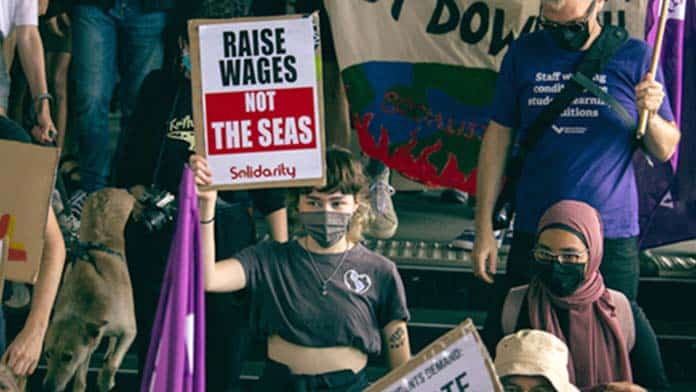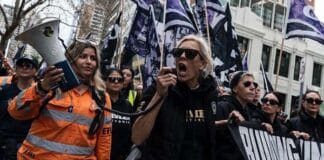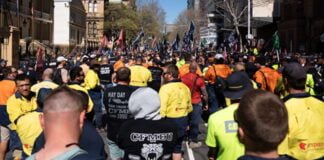New Prime Minister Anthony Albanese spent much of the last month overseas, reassuring the major imperialist powers that Labor is just as militaristic and aggressive towards China as Scott Morrison.
Albanese’s first act was to attend the Quad meeting in Japan declaring “there has been a change of government but Australia’s commitment to the Quad… will not change.” He went on to the NATO summit in Madrid as it declared China a threat to its “interests, security and values”.
He then joined the Pacific Islands Forum, anxious to disrupt China’s efforts to sign economic and security deals with the island states, welcoming the US’s pledge of a greater presence in the Pacific, saying “the message” to China was clear.
At home, the cost of living crisis is worsening as rising inflation means workers’ real wages are falling.
The Reserve Bank has now hiked interest rates by 1.25 per cent since May, with more increases expected, pushing up mortgage payments. On 1 July default power prices increased by around 10 per cent in most states.
Instead of taking any action, the Labor government continually says that it can’t afford to do anything. Treasurer Jim Chalmers keeps telling us there isn’t an “endless source of money” while Labor is also using the debt left by the Coalition to justify spending austerity.
It increased aged care funding by just 1.7 per cent for the next year, far less than inflation. Aged care centres have to fund a 4.6 per cent wage rise for workers on award wages but are getting no help from Labor, despite their promises to fix aged care.
Despite Labor claims that no one will be left behind, Albanese was even refusing to extend pandemic leave payments for workers with no sick leave until an outcry from the union movement, doctors and health groups forced him to back down. But Labor has only extended the payments until 30 September.
COVID cases are rising again and hospitals are at breaking point. But Labor is also refusing to restore the free rapid tests for pensioners and the unemployed.
Chalmers says he will offer a grim assessment of Australia’s economy when parliament opens on 26 July. Yet Labor is pressing ahead with the third stage of the Coalition’s tax cuts, with the biggest benefits for those on over $200,000, at a cost of an eye-watering $15.7 billion in 2024. It is also committed to spending $179 billion on nuclear submarines, money that could boost funding for hospitals and aged care many times over.
It has also ruled out a windfall profits tax on the coal and gas companies that are making a killing as international prices soar. The Queensland Labor government has increased its royalties on coal companies. Albanese should do the same.
Public sector workers in NSW are showing how to fight the cost of living increases. Teachers have taken three days of strike action since December, while nurses held a mass meeting at the end of June, voting to demand a 7 per cent pay rise and staffing ratios. Nurses in WA are also fighting for 5 per cent for each of the next three years.
If the union officials organised joint strike action, the NSW Liberal state government’s pay cap could be broken.
Climate targets
One of Labor’s priorities as parliament resumes is to legislate its climate target of 43 per cent emissions reduction by 2030.
The latest floods around Sydney, the Hunter Valley and the Central Coast in July showed again the urgency of climate action. Some houses in NSW were flooded for the third time this year. Europe is experiencing extreme heat along with bushfires in France, Spain and Portugal.
But Labor’s legislation is toothless and its target is nowhere near enough. It is even less than the Business Council of Australia’s target of 50 per cent. And it is not enough to meet the safe limit on warming agreed at international climate summits of 1.5 degrees. Labor needs a target of 75 per cent to be consistent with this, according to the Climate Council.
Anthony Albanese talks about wanting to end the “climate wars”, but we need a real war on climate change.
Albanese is demanding that The Greens wave through his target in the Senate, insisting that he is not open to any discussion about increasing the target.
Yet Labor is supporting new gas and coal mines. Labor’s Resources Minister Madeleine King has declared the government “absolutely” supports the WA Scarborough gas project that alone will add 7 per cent to Australia’s emissions by 2030.
The International Energy Agency warned last year that no more coal or gas projects are possible if warming is going to be kept to 1.5 degrees, yet Australia has at least 114 new coal and gas projects in the planning stage.
The need for action is urgent. But that’s not going to come through parliament. It will be strikes and protests that can win the change we need on cost of living and the climate.






